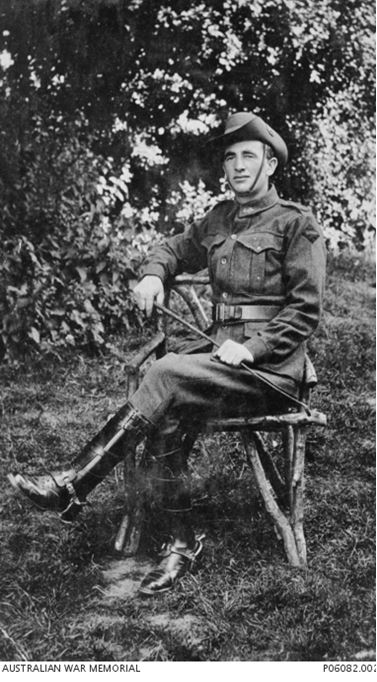Difference between revisions of "Francis William Singleton"
From Our Contribution
| Line 26: | Line 26: | ||
| unit = Hospital Transport Corps, transferred to 14th Australian Field Ambulance | | unit = Hospital Transport Corps, transferred to 14th Australian Field Ambulance | ||
| embarkationdatefrom = 22 Feb 1915 | | embarkationdatefrom = 22 Feb 1915 | ||
| − | | embarkationdateto = | + | | embarkationdateto = 24 Mar 1915 |
| shipembarked = HMAT A50 Itonus | | shipembarked = HMAT A50 Itonus | ||
| embarkedshipnote = Transport duty | | embarkedshipnote = Transport duty | ||
Revision as of 00:20, 2 August 2018
 | |
| Personal Information | |
|---|---|
| Date of Birth | 17 Feb 1884 |
| Place of Birth | Plumstead, England |
| Death | 22 Jan 1965, aged 87 |
| Place of Death | Midvale, Western Australia |
| Age at Enlistment | 30 years, 11 months |
| Description |
5'8½" (1.74m) tall ; 139lbs 63.049 kg ; sallow complexion ; hazel eyes ; dark hair ; tattoos of breast of a woman on his right upper arm, a dancing girl, ship left lower arm and a dagger and snake left forearm |
| Occupation | Labourer |
| Religion | Church of England |
| Address | Dulwich street, East Cannington |
| Next of Kin | Wife , Mrs Clara Charlotte Singleton |
| Military Information | |
| Reg Number | 1829 |
| Date of Enlistment | 13 Jan 1915 |
| Rank | Private |
| Unit/Formation | Hospital Transport Corps, transferred to 14th Australian Field Ambulance |
| Date of Embarkation | 22 Feb 1915 ‒ 24 Mar 1915 |
| Ship Embarked On | HMAT A50 Itonus Transport duty |
| Date of Embarkation | 19 Jul 1916 |
| Ship Embarked On | HMAT A69 Warilda |
| Date of Return | 13 Dec 1915 ‒ 14 Jan 1916 |
| Ship Returned On | HMAT A62 Wandilla transport duty |
| Date of Return | 10 Mar 1918 |
| Ship Returned On | HMT Durham Castle transport duty |
| Fate | Returned to Australia |
| Monument | Gosnells Road Board Honour Roll |
| Medals |
1914-15 Star British War Medal Victory Medal |
Pre War
Francis William Singleton was born in Plumstead on 17 February 1884 and his parents were William Singleton and Emma Alexandra Singleton (nee Blake), his father was a labourer in a gun factory. He finished school about the age of 12 years and by the Census on 31 March 1901, Francis was living at 33 Kashgar Road, Plumstead as a boarder, working as bricklayer.
He joined the British Army, serving for 6 years as a Private with the Royal Army Medical Corps (Service No. 1819) and served in South Africa with the Royal Army Medical Corps where he earned the Queen’s South Africa Medal with one clasp “South Africa 1902.
Francise married Clara Charlotte Gray on 14 July 1906 at Telscombe, Sussex. Following his discharge from the army he and his wife moved back to live with his widowed mother at Alexander Cottage, Soutsfield Road Tatsfield, Westerham, Surrey. She was owner of a local Poultry Farm and was assisted by Francis who was working as farm labourer according to the 1911 Census.
In the same year, Francis with his wife, two children (Francis and Albert) and his mother took 3rd class passage on 11 July on the S.S. Osterley, from London and arrived in Fremantle on 8 August 1911.[1]
War Service
Entered Blackboy Hill camp on 15 Jan 1915 and a month later he was allocated to the 4th reinforcement draft for the 11th Battalion. On 9 Apr 1915 he was transferred to C Company of the newly formed 28th Battalion, but was transferred again, this time to the Australian Medical Corps Hospital Transport Corp, and was assigned to HMAT A70 Ballarat. It would appear that he remained with the Ballarat until he returned to Australia on 14 Jan 1916.
Transferred to the 14th Field Ambulance and given a new Service No. of 1829, he returned to England on 19 Jul 1916 aboard HMAT A69 Warilda. On his arrival in England, Francis reported to the Parkhouse camp in Salisbury. On 12 Oct 1916 he proceeded overseas to France and on 4 Nov 1916 he was dettached to the 8th Australian Field Ambulance. On 13 Nov 1916 he returned to the 14th Australian Field Ambulance. Detached again on 3 Dec 1916, this time to the 53rd Battalion.
Admitted to 56th Casualty Clearing Station hospital on 2 May 1917 with a Pott's Fracture (injury to ankle). Adjudged to be accidental, it happened when he was carrying a soldier on 30 Apr 1917 at Becourt. On 15 May 1917 he was placed on an Ambulance Train for the coast and evacuation to England.
In England he was admitted to the 1st Southern General Hospital on 16 May 1917, he was released to the 3rd Australian Auxiliary Hospital on 8 Jun 1917. Discharged to the 5th Convalescent Depot on 13 Jun 1917 he was well enough to resume duty on 9 Jul 1917. Francis returned to Franc briefly, before returning to England on 24 Dec 1917, and on 4 Mar 1918 resuming his previous nursing duty on transport ships, returning to Australia on the HMT Durham Castle.
Post War
Francis's son Edward George served during WW2 as a wireless Operator/air gunner in the RAAF.
Notes
- ↑ Gosnells Local History Collection